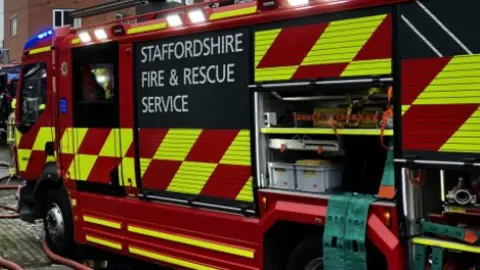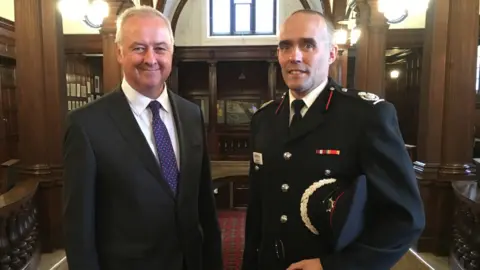Decision due on deploying reduced fire crews
 BBC
BBCA controversial policy of deploying reduced-size, on-call fire crews to incidents in Staffordshire could become permanent.
At least four firefighters usually crew an engine, but Staffordshire Fire and Rescue has been trialling on-call teams of three.
Senior officers say the change has improved response times and availability of applicances, but critics, including the Fire Brigades Union (FBU), say the move is putting lives at risk.
The fire service’s governance board is now set to make a final decision in December on whether to permanently adopt the three-rider policy.
Staffordshire Police Fire And Crime Commissioner Ben Adams received an update on the progress of a trial scheme during a public performance meeting.
Senior staff said that during the 16 months of the trial, three-person crews had attended 636 incidents, including building fires and crashes, adding that in August, a three-person team attended a house fire in Lichfield, with firefighters entering the building to rescue the occupant.
Deputy Chief Fire Officer Glynn Luznyj said that while the service was still aiming to have at least four firefighters on board its on-call appliances, three-person crews were deployed when this was not possible.
It had led to an increase in the availability of on-call engines, he said, with three-person crews arriving at incidents an average of nine minutes, 45 seconds sooner than the next fully-crewed appliance.
Mr Luznyj added: "This is all about improving the opportunity for our firefighters to make faster and earlier interventions, while the next nearest appliances are being mobilised as normal."
 LDRS
LDRSThe FBU and some councillors in Staffordshire say that a three-person crew cannot safely deploy breathing apparatus teams into burning buildings, meaning lives could be put at risk.
This criticism has become more prominent following the Lichfield incident, where the crew opted to enter the house despite it being normal policy to wait for colleagues to arrive.
But chief fire officer Rob Barber insisted that on-call firefighters were qualified to make such decisions.
"Every one of those on-call firefighters is a highly trained professional that will conduct a dynamic risk assessment," he said.
Mr Luznyj acknowledged there were concerns about the trial, but said that crews getting to the scene faster and "laying the groundwork" for oncoming appliances was adding "massive value" to public and firefighter safety.
This news was gathered by the Local Democracy Reporting Service which covers councils and other public service organisations.
Follow BBC Stoke & Staffordshire on BBC Sounds, Facebook, X and Instagram.
